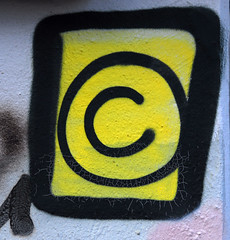Most associations get assignment of copyright for articles, speeches, reports, etc. as a routine C.Y.A. measure. But according to the lawyers I talked with, anything that can be considered a "copyrightable contribution" should also be covered with a waiver or contract. And apparently, convincing a judge or jury that a volunteer has made a "copyrightable contribution" is not difficult. I specifically asked about volunteers who develop conference agendas or themes. I was told that those could very likely be considered "copyrightable contributions." One lawyer wrote:
"In other words, the contribution would need to constitute a unique expression of an idea -- e.g., not just a statement of fact, or something with no creativity or originality -- to qualify as a copyrightable contribution. But recognize that it is a relatively low standard we are dealing with here."
So now we are trying to figure out how to implement this. I want to do it in a transparent, yet unobtrusive way. I'm trying to navigate the gray zone in between, and I'm having a hard time sorting it through.
On one end of the spectrum, we could have a little sentence at the bottom of our online volunteer sign-up form that says something like "By submitting this form, you agree to the terms and conditions of our volunteer program," with a link to the terms and conditions. On the other end, once volunteers are appointed, we could ask all members to confirm their volunteer appointment by signing and returning a waiver. Somewhere in the middle of the spectrum, we could ask the member to "initial" somewhere on the online form which would basically indicate that they have read and understand the terms and conditions.
Ouch! Just typing this out is giving me heartburn. Going forward with this is going to be an administrative burden for us and a hurdle for members who want to get engaged. David Gammel writes how members are beginning to expect to make a meaningful contribution to their association in the first ten minutes of their membership, not wait ten years for a committee appointment to contribute. And I agree. Seems to me, though, the appropriate transfer of intellectual property is a major hurdle for associations trying to get there.
Questions:
Are the chances of us actually getting sued over this so remote that we shouldn't worry about it? Shouldn't there be a law that exempts (or protects) organizations from copyright infringement litigation when the intellectual property is transferred in a volunteer setting? Is creative commons a solution for this quagmire?
Tagged: Association Management Associations CAE Certified Association Executive copyright intellectual property volunteers


2 comments:
Just an evil I'd say Ben. The last thing you want to do is listen to attorneys on an issue such as this one. Don't misunderstand me, I know your lawyers mean well, but they have no frame of reference for understanding the problems that a strict copyright regime creates. They are trained to protect your organization, keep it from stepping in something it shouldn't. But this is not an issue that will work to your association's benefit if it is addressed primarily by a legal framework, especially since that framework only exacerbates the problem.
I think your intuition about the Creative Commons is right on. All associations, including VSCPA, need to rethink how the fruits of collaborative knowledge work can benefit the greatest number of people, and not just the organization.
Listen to your gut. Even ASAE recently stopped exerting copyright for submitted articles. They do claim a licenses to do anything they want with it forever but they don't claim ownership. That works for me as an author who wants to maintain ownership of my own work.
Post a Comment